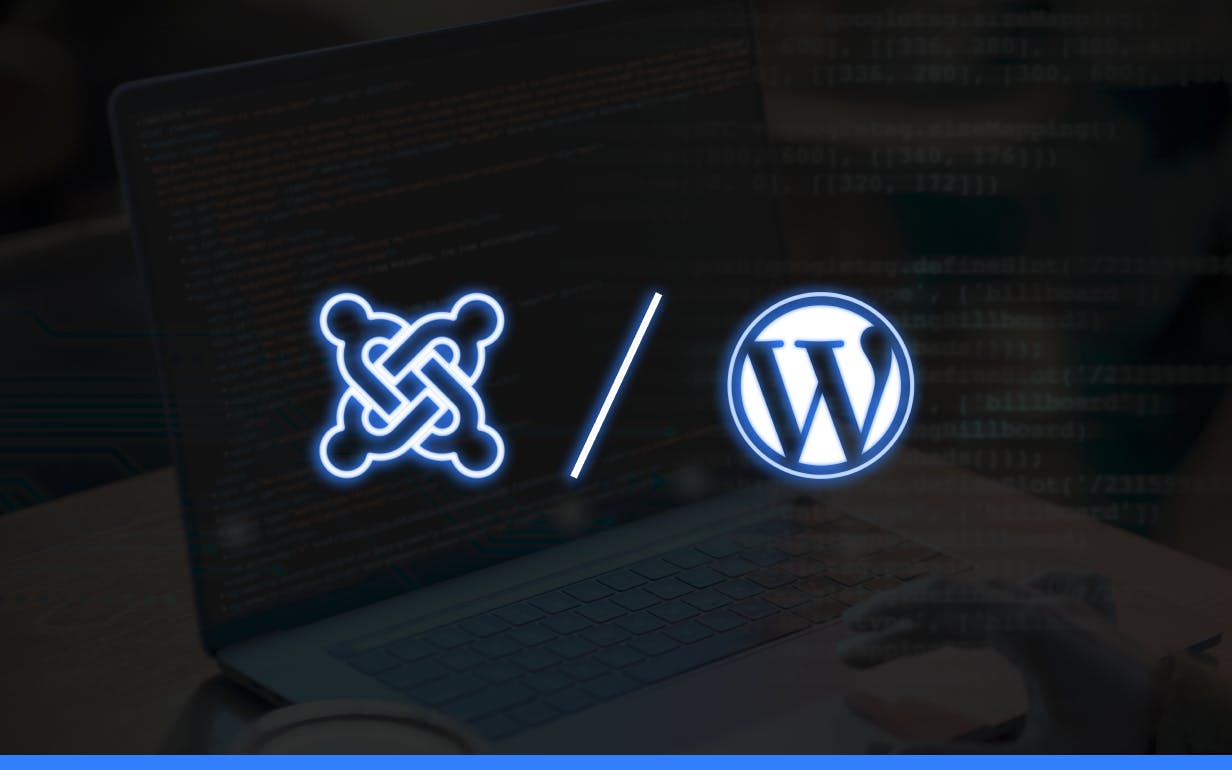What is Joomla? What is a CMS? Which is the better CMS, when comparing Joomla vs WordPress? How to choose a CMS for your website?
Find answers to these questions, and more insights about WordPress and Joomla, in this post.
Content is one of the most important elements of a website. The content informs the readers of the information they seek. Content also serves an important purpose from an SEO or Search Engine Optimization perspective.
Most websites host a large amount of content across multiple domains, pages, and sections. Managing the content without a streamlined approach is very difficult. Poorly managed content can hamper the performance, transparency, and user experience. Thus, most websites use a CMS or Content Management System to manage their content.
What is a CMS?
A Content Management System or CMS helps to create, update, manage, and modify the content published on the website. Web developers use various content management systems, depending on their requirements, complexity, and use cases. WordPress and Joomla are two of the most popular content management platforms on the market.
Developers would find uploading content to their website difficult without a CMS. They would also have to add the content at specific locations in a static HTML file if there is no CMS. These steps are time-consuming, overly complex, and difficult to maintain.
What is Joomla?
Joomla is a free and open-source CMS to build content and publish it across websites and online applications. Joomla is widely applicable, easy to use, stable, customizable, and secure. Joomla serves as a content management system and a website development platform that includes plugins, modules, and extensions.
Open Source Matters Inc. developed Joomla in 2005. Joomla offers responsive templates for customization and adaptation for mobile platforms. Joomla provides over 6000 extensions, and unique site modules to create websites.
Joomla hosts a secure permission level controller that controls user access for better security, and efficient site administration. Joomla supports website analytics, search engine optimization (SEO), link management, polls, and other features.
What is WordPress?
WordPress is a very simple, convenient, and modular platform for creating websites. Currently, WordPress holds a market share of over 43.3 percent. WordPress is a free and open-source content management system with a massive ecosystem of tools, plugins, and themes.
Automattic created the WordPress.org foundation and WordPress.com. Though WordPress began as a platform for creating simple, basic blogs, today it can create corporate websites, eCommerce platforms, social networking sites, online forums, and much more.
Related post: WordPress Development: Here’s What You Should Know.
Joomla vs WordPress: Which is better?
WordPress and Joomla are the top-ranking content management systems, with their unique characteristics. Here are a few major differences between them.
1. Ease of use and accessibility
Joomla is more complex than WordPress and has a steep learning curve. Joomla is difficult to install and access. WordPress is very user-friendly and well-suited for beginners. WordPress is accessible and very easy to install.
2. Blogging support
Joomla is not ideal for blogging. WordPress, on the other hand, is perfect for blogging. WordPress hosts multiple themes and tools that are aimed at optimizing blogging websites.
3. Security
Joomla development team and community ensure early resolution of the security threats. They release patches to counter security attacks.
WordPress has a secure source code, and it responds quickly to cyberattacks. The auto-update feature permits automatic website updates with newly released security patches.
4. Multi-lingual support
Joomla supports multiple languages. WordPress lacks multi-lingual support, but users can use third-party plugins like WPML, Polylang, Weglot, and others to integrate and enable multi-language support.
5. Database and supported programming languages
Joomla is written in PHP and uses object-oriented programming or OOP techniques with software design patterns. Joomla supports MySQL, PostgreSQL, MS SQL, and more. WordPress is based on PHP and only supports MySQL for its database.
6. Themes and plugins
The official Joomla website lists around 8000+ Joomla plugins. There are also a few premium Joomla templates that can be used for web page customization.
WordPress websites can be improved with more than 60,000 free and paid plugins. With more than 5500 free themes, WordPress websites can be fully customized.
7. Search engine optimization (SEO)
Developers must be technically sound to implement SEO for Joomla web pages and applications. However, search engine-friendly URLs and URL rewriting are some of the many SEO features of Joomla. EFSEO is a useful SEO plugin for Joomla.
WordPress is SEO friendly. Many WordPress themes contain useful SEO features. Yoast SEO is a powerful SEO plugin for WordPress websites. WordPress also hosts analytics and tracking features that are easy to set up.
8. eCommerce and payment gateways
Joomla hosts 54 free and paid extensions for payment gateways. Web developers can integrate them to enable payment solutions for eCommerce websites.
WooCommerce is a customizable, open-source eCommerce platform built on WordPress. It offers more than 100 payment gateways that provide flexibility with online payments.
9. Pricing
Joomla is free, but the charges for the domain, security (SSL), maintenance, web development, and other peripherals. All services can amount to up to $7000.
Although WordPress is free, the cost of developing a customized website with WordPress ranges from $100 to $3500. When high-end plugins, tools, and features are implemented, the total costs can surpass $25000.
Joomla vs WordPress: Choosing the right CMS for your website
Both Joomla and WordPress are highly modular content management systems with some pros and cons. Where WordPress is easy to learn, easier to implement, and offers a great web development experience for non-developers, Joomla is highly customizable, feature-intensive, and does not rely heavily on extensions.
WordPress is the best option if your website is simple, needs a standard level of customization, with tools and themes that are easily available on the internet. Joomla is ideal for tech-savvy web developers who need to customize the code and create a CMS that fits their requirements.
Due to a high volume of websites being created, developers with experience in WordPress, Joomla, and other CMS will continue to be in demand.
Due to the high demand, companies prefer hiring remote software developers to create websites. Turing offers a unique platform that provides remote software developers and web developers to companies.
Are you looking for remote web developers? Turing can help you build a team of pre-vetted, Silicon Valley-caliber web developers at unmatched prices within 3-5 days. Visit the Hire Developers page to learn more.
FAQs
1. Is WordPress better than Joomla?
WordPress is simpler than Joomla, easier to customize, and hosts a lot of free/premium templates and plugins for designing a website. From the developers’ perspective, beginners are more comfortable with WordPress due to its user-friendly interface and intuitive customization tools.
2. Is Joomla good for websites?
Joomla is an exceptional content management system for creating, publishing, and updating content across web pages. When used correctly, Joomla produces outstanding SEO results and offers a unique user interface. Developers can customize their websites to the fullest extent with Joomla.
3. Does anyone still use Joomla?
Joomla is a very popular CMS, ranking 2nd next to WordPress in 2022. More than three percent of all websites on the internet are made with Joomla. Joomla holds almost 5.5 percent of the market share of the CMS market.
Kedar Kanekar
Want to accelerate your business with AI?
Talk to one of our solutions architects and start innovating with AI-powered talent.



